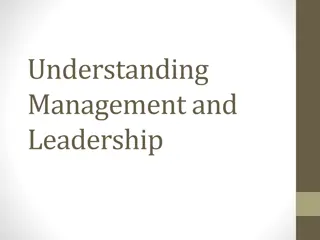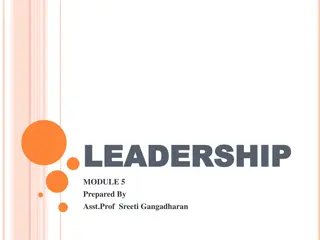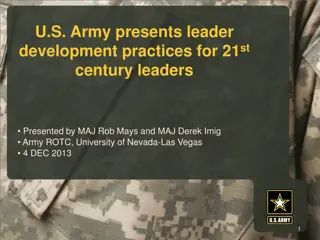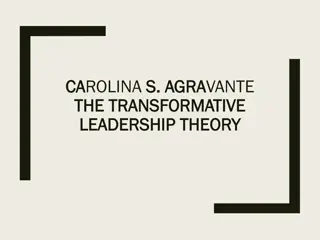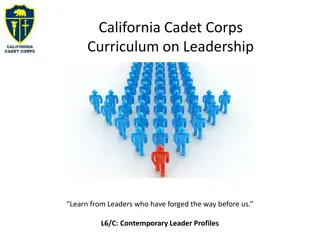RVGS Summer Leadership Institute - What Makes a Good Leader?
RVGS Summer Leadership Institute Session 1 on June 8 focuses on the essence of leadership and the qualities that define a good leader. The program offers a structured format with nine sessions to enhance participants' leadership skills and understanding. Each session provides opportunities for practical application and reflection, emphasizing interactive learning and the exchange of insights among peers.
Download Presentation

Please find below an Image/Link to download the presentation.
The content on the website is provided AS IS for your information and personal use only. It may not be sold, licensed, or shared on other websites without obtaining consent from the author. Download presentation by click this link. If you encounter any issues during the download, it is possible that the publisher has removed the file from their server.
E N D
Presentation Transcript
RVGS Summer Leadership RVGS Summer Leadership Institute Institute Session 1 June 8 What is leadership and what makes a good leader? Please remind Mr. Levy to hit record if he forgets!
General General Format for this Leadership Institute Format for this Leadership Institute Nine sessions from June 8 to July 27 (Mondays at 10:00 unless otherwise noted) First several sessions will start with basic principles, with guest speakers later in the series It is recommended to attend in real-time, but recordings are available and are valid for completion as needed Breakout sessions: random groups, with one person serving as team leader; practice the principles we discuss in the sessions, but let the team leader be the leader; team leader will rotate so everyone gains the equal opportunity for experience Weekly reflection activities at end of session; your are encouraged to discuss your responses with peers in the group, but can be completed individually Chat will be left on for people to add on-topic, constructive comments
Objectives Objectives for the Leadership Institute for the Leadership Institute I hope you gain the following benefits from this program: Improved understanding of what leadership truly means to become a better leader for others Experience with short, low-stakes leadership opportunities in a trusted setting Skills of interacting and communicating with others The opportunity to reflect further on your personal priorities in leadership Learning from the expertise of established leaders Stimulating mental activity during the summer!
Todays Topic: What is Leadership and What Today s Topic: What is Leadership and What Makes a Good Leader? Makes a Good Leader? Major topics for today What is leadership Characteristics of a leader Establishing yourself as a leader in a group
Breakout 1: What leadership is (and isnt) Breakout 1: What leadership is (and isn t) Note: If you want to discuss your responses to the weekly activity with peers, you might consider trading your contact info or making plans to meet up in this room to chat later. Team leader will be the person in your group whose first name is first alphabetically. Let s quickly discuss that person s responsibilities In your team, develop of a list of three ideas of what leadership is. Then identify three things that isn t necessarily part of leadership (think of misconceptions of true leadership). Someone (not the team leader) in the group needs to put brief summaries of your responses in a document so you can copy and paste when we come back from breakout. You will have eight minutes for this discussion I ll give a one minute warning in the chat. Screenshot this slide, it won t be in your breakout room
Breakout Review Breakout Review Person who recorded the group s responses: Paste them to the chat. Paste the responses for what is leadership with IS - at the beginning. Separately post the second set of responses starting with NOT . Team leader: Please post one observation about your experience leading the discussion (could be something challenging, something that worked, something about the discussions, etc). Start your chat post with TL Key point for this and future chat posts: We are NOT trying to demonstrate that we are the smartest person in the room just trying to prompt some interesting reflection points for your peers.
Mr. Levys definition of what leadership is Mr. Levy s definition of what leadership is Leadership is the act of inspiring a group/organization and its individuals toward self-actualization. First, can someone explain what self-actualization is? ACT: leadership is a continuous action, not a position of authority; you can build good will from past actions, but your most recent actions can undermine those efforts if you aren t careful INSPIRING: rather than forcing or bossing; remember that people care about what they want and their own interests, so you need to appeal to them with your purpose; this provides a basis for a shared vision for the group GROUP/ORGANIZATION: there are many settings and scales at which leadership is important INDIVIDUALS: You can t lead a group if you aren t a leader to the individual people in that group SELF-ACTUALIZATION: Later, we ll discuss why I identify this aim instead of meeting a particular objective the organization has
What Makes a Leader? What Makes a Leader? It s not simply a formal role in a group. You can be a leader without a title or have a title, but lack real leadership Formal Authority vs Informal Authority Formal Authority derives from a title or position (e.g., team leader, store manager, school principal) Informal Authority derives from the people in the organization; earned through respect, relationships, and past actions. Could be bestowed to the formal leader, but only if they have genuinely earned it
An Important Note An Important Note People are typically poor judges of themselves and the own abilities. Sometimes we underestimate ourselves, but often people overestimate how good they are at something. Some people consider themselves natural leaders and feel they just need to trust their gut and intuition. Get rid of that thought most of the time your gut is stupid, self- confirming, and a little selfish (but pretends otherwise). Some good leadership traits can be natural, but you need to actively develop them and cultivate new ideas through reflection and experience.
A few good sources for information A few good sources for information It s Your Ship Michael Abrashoff [must read for leaders] How to Win Friends and Influence People Dale Carnegie [good for personal interaction with others] Start with Why Simon Sinek [good for inspiring others with big picture ideas] Tipping Point Malcolm Gladwell [interesting review of why things catch on ] Leadership Doris Kearns Goodwin [review of three presidents history and leadership styles] Decisive Dan and Chip Heath [good for decision-making] Various books by Jim Collins [investigations of what makes companies successful] Inner Game of Tennis Timothy Gallwey [understanding how to help people/yourself learn]
Breakout 2 Breakout 2 What makes a good leader What makes a good leader Team Leader person with birthday latest in the year Each person comes up with one characteristic of a good leader. Each person shares their characteristic with the group and explains why it s important The Team Leader will pick one characteristic (not their own contribution) that will be shared with the full group. They will explain to the breakout group they selected that characteristic as the one that will be shared. This includes a good exercise. Don t worry about winning by being picked as best (the TL might not even be picking based one which they think is best anyway). The TL gains practice with the difficult job of picking one option without alienating the other group members. You have 8 minutes for this breakout. I ll give a one minute warning.
Breakout Breakout review review Team leaders please type the characteristic you selected from your group. Everyone should read and consider the characteristics listed.
My answer: Authentic My answer: Authentic Why authentic ? You are authentic when youractions are congruent with your beliefs. If you are truly authentic, that also implies consistency if your priorities are fairly stable. I m not saying this is the best or only answer, but I believe it is a critical element. Let s explore it s importance in gaining informal authority
Establishing Yourself as a Leader Establishing Yourself as a Leader First, it s important to recognize that being A leader doesn t have to be you are THE leader. Power struggles are for petty folks if you are worthy, people will appreciate you you don t need to compete for it. Receiving formal authority can be rare and, as we discussed, that doesn t always mean much anyway. To be a leader, you need to establish informal authority Note: that isn t meant as authority over others; think more of the authority invested in someone who is respected in their field.
Why is authenticity important for informal Why is authenticity important for informal authority? authority? When your actions are congruent with your beliefs, that means people can quickly figure out what you stand for. The Celery Test That clarity communicates a potential shared vision that other people can choose to align with by following your lead. If people can see what you stand for, you will attract people who find that vision appealing.
Leadership worthy of following Leadership worthy of following People will only invest themselves in a vison that motivates and inspires them. This means you need values that are appealing to others! If your goal is self-serving (self-aggrandizement, personal advancement, etc), people will see through that and not be interested. If your goals are vapid or uninspired like corporate profit or simply meeting an objective people will only care if they are personally interested in that goal. So what DOES appeal to the large majority of people?
What really motivates people What really motivates people The deepest principle in human nature is the craving to be appreciated. William James The deepest urge in human nature is the desire to be important. John Dewey People want to be appreciated, feel important, and be part of something bigger than themselves. Think back to my previous definition of leadership: if your authentic aim is to help others self-actualize and people view you as someone who can do that for them (and values them enough to do so), they will be excited to follow your leadership and will place their trust in you.
Weekly Weekly Reflection Activity Reflection Activity Note: you can reflect on this on your own, but the best benefit will come from discussion with other. I encourage you to use your group from today for discussion (if you are watching a recording of the session, consider discussing this with family or friends). You are in a group of peers (scouts, key club, youth group, etc) and the group needs to plan a fundraiser. The group is supposed to collectively come up with a plan, and no one has been named to a formal leadership role in the discussion. Using what we talked about today, reflect on what steps you could take to gain informal authority and demonstrate leadership in your group. What actions might undermine that effort? I will turn on presenter rights to this room so you can meet here with your team to discuss your ideas if you want. NEXT SESSION IN THIS SERIES: Next Monday at 10:00 AM







